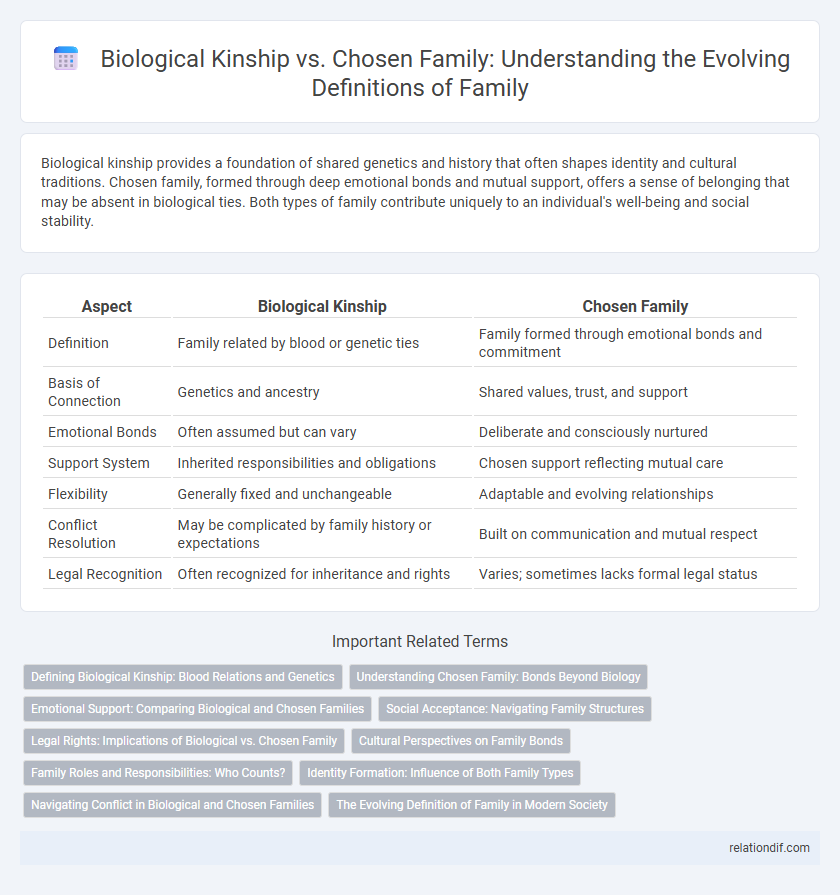Biological kinship provides a foundation of shared genetics and history that often shapes identity and cultural traditions. Chosen family, formed through deep emotional bonds and mutual support, offers a sense of belonging that may be absent in biological ties. Both types of family contribute uniquely to an individual's well-being and social stability.
Table of Comparison
| Aspect | Biological Kinship | Chosen Family |
|---|---|---|
| Definition | Family related by blood or genetic ties | Family formed through emotional bonds and commitment |
| Basis of Connection | Genetics and ancestry | Shared values, trust, and support |
| Emotional Bonds | Often assumed but can vary | Deliberate and consciously nurtured |
| Support System | Inherited responsibilities and obligations | Chosen support reflecting mutual care |
| Flexibility | Generally fixed and unchangeable | Adaptable and evolving relationships |
| Conflict Resolution | May be complicated by family history or expectations | Built on communication and mutual respect |
| Legal Recognition | Often recognized for inheritance and rights | Varies; sometimes lacks formal legal status |
Defining Biological Kinship: Blood Relations and Genetics
Biological kinship is defined by blood relations and genetic connections inherited from common ancestors, forming the foundation of family lineage through shared DNA. These genetic ties establish hereditary links that influence physical traits, medical history, and identity within biological families. Understanding biological kinship involves tracing genealogy and genetic markers that differentiate it from social or chosen family bonds based on emotional support rather than genetics.
Understanding Chosen Family: Bonds Beyond Biology
Chosen family transcends biological kinship by emphasizing emotional support, shared values, and mutual care regardless of genetic ties. These bonds often emerge in marginalized communities, where traditional family structures may not provide acceptance or understanding. Recognizing chosen family highlights the diverse ways humans create meaningful connections that contribute to well-being and identity.
Emotional Support: Comparing Biological and Chosen Families
Emotional support from biological kinship often stems from shared genetics and lifelong bonds, providing a foundation of unconditional care and familiarity. Chosen families, built through intentional relationships, offer emotional support tailored to individual needs, often stepping in when biological ties are strained or absent. Both forms of family contribute uniquely to emotional well-being, with chosen families frequently emphasizing empathy and mutual understanding beyond genetic ties.
Social Acceptance: Navigating Family Structures
Biological kinship often provides a foundation of shared genetics and cultural heritage, but social acceptance can vary widely within these relationships, influencing emotional bonds. Chosen families, formed through intentional social connections, frequently offer inclusive support systems that prioritize acceptance and understanding over genetic ties. Navigating family structures requires recognizing the diverse ways in which social acceptance shapes identity, belonging, and resilience beyond traditional biology.
Legal Rights: Implications of Biological vs. Chosen Family
Legal rights often prioritize biological kinship, granting automatic inheritance, custody, and decision-making privileges to blood relatives. Chosen families, despite emotional significance, frequently face legal challenges in areas like hospital visitation, medical decisions, and property rights without formal recognition or legal documentation. Establishing legal protections through wills, power of attorney, or adoption is essential for chosen families to secure comparable rights and recognition.
Cultural Perspectives on Family Bonds
Cultural perspectives on family bonds reveal diverse interpretations of kinship beyond biological ties, emphasizing emotional support and shared values in chosen families. In many Indigenous cultures, kinship extends through communal ties, reinforcing obligations and identity even without blood relations. Contemporary Western societies increasingly recognize chosen families as vital social units that fulfill emotional and caregiving roles traditionally associated with biological families.
Family Roles and Responsibilities: Who Counts?
Biological kinship often defines family roles and responsibilities through genetic ties, legal obligations, and cultural expectations, establishing who counts as family by birth or formal relation. Chosen families prioritize emotional bonds, mutual support, and shared values, redefining family roles based on trust, care, and commitment rather than genetics. Understanding family roles and responsibilities requires recognizing both inherited connections and self-selected alliances that fulfill individuals' social and emotional needs.
Identity Formation: Influence of Both Family Types
Biological kinship shapes identity formation through inherited genetics, cultural traditions, and shared history, providing a foundational sense of belonging and continuity. Chosen family contributes to identity by offering emotional support, affirming individual values, and fostering resilience, particularly for those marginalized or estranged from biological relatives. Both family types interact dynamically, influencing self-concept, social roles, and psychological well-being across diverse life stages.
Navigating Conflict in Biological and Chosen Families
Navigating conflict in biological and chosen families requires understanding the unique dynamics of each relationship. Biological kinship often involves inherited expectations and deep-rooted emotional ties, which can complicate resolution efforts, while chosen families prioritize intentional bonds and shared values that facilitate open communication and mutual support. Effective conflict navigation depends on recognizing these differences and applying empathy, active listening, and boundary-setting tailored to the specific family context.
The Evolving Definition of Family in Modern Society
Biological kinship traditionally defines family through genetics and legal ties, yet modern society increasingly embraces chosen family as a vital support system formed by emotional bonds and shared experiences. This evolution reflects diverse social dynamics, recognizing LGBTQ+ communities, blended families, and close friendships as legitimate family units. Research indicates that chosen families significantly contribute to individuals' mental health and social well-being, expanding the conventional family paradigm beyond ancestry.
biological kinship vs chosen family Infographic

 relationdif.com
relationdif.com